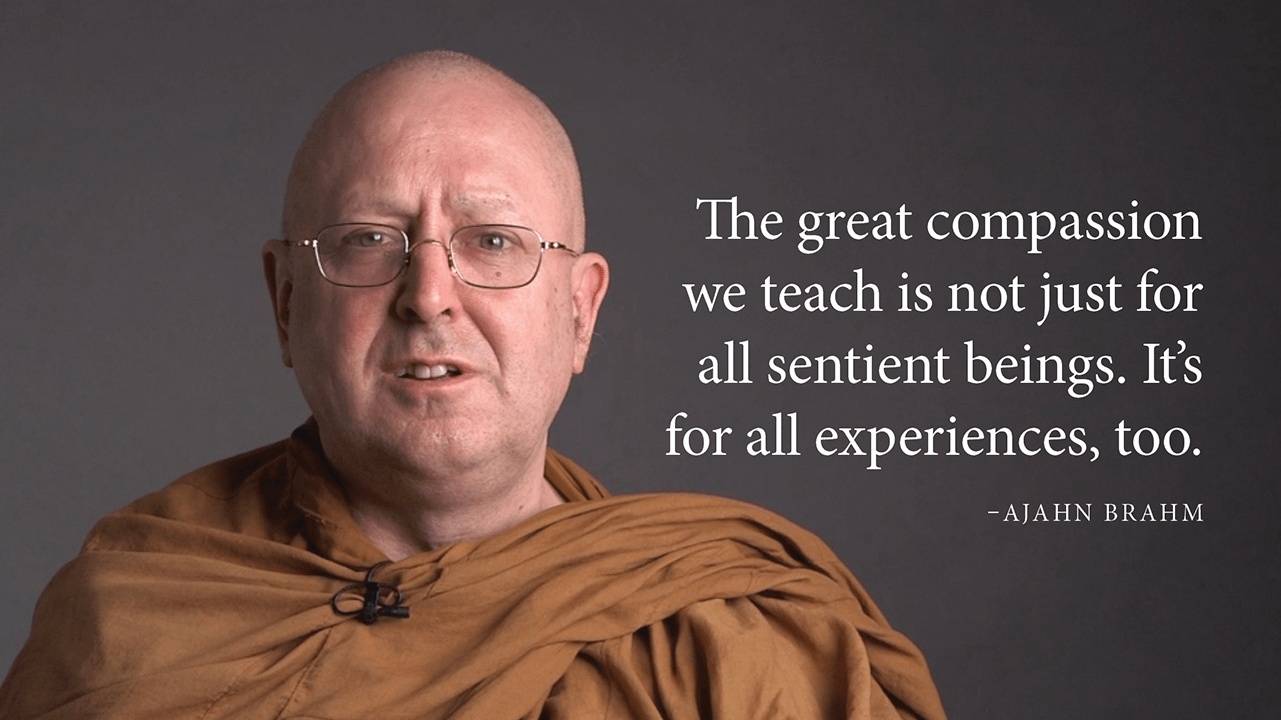In this video series from Buddhadharma, Ajahn Brahm offers four short, insightful teachings.
The editors of Buddhadharma were fortunate to have a visit with Theravada Buddhist monk Ajahn Brahm. Brahm is normally found in Western Australia, where he is the Abbot of Bodhinyana Monastery and a famous advocate for the full ordination of Buddhist nuns. He is also the author of many books including Kindfulness, Who Ordered This Truckload of Dung?, and Mindfulness, Bliss, and Beyond.
Ajahn Brahm sat down in front of our camera to talk about working with, um, shitty and painful experiences and building Buddhist communities. As you’ll see, his can be a funny, inspiring, and unconventional approach to teaching the dharma. Enjoy.
How to Make the Most of the “Shit in Our Lives”
Transcript
So we all get shit in our lives. Some people get born in shit. Some people grow into shit. And some have shit thrust upon them. That’s paraphrasing Winston Churchill. When you do have shit thrust upon you, accept it — you’ve got no choice — and you dig it in. Under an apple tree. In a garden. We all know that shit is incredible fertilizer.
I love telling people: if you dig in the shit of your life, under the apple tree, then one year later, your apples will be sweeter and juicier than ever before. But you must always remember, when you bite in to that apple, and when you taste its succulent flesh, and the juice drips down your cheek — you must always remember what you are really eating. You’re eating shit. Only its been transformed into juicy apple! And that’s the story of life.
We all have our difficulties and problems. Our sufferings in life. But we learn how to dig those in and turn them into the beautiful flowers of compassion and the beautiful fruit of wisdom.
How to Accept Your Most Painful Moments
Transcript
When you see people who have these traumatic experiences and they try and push them away. They try and reject them. They’re trying to get rid of them, and that does not work.
So, the great compassion, which we teach in Buddhism, it’s not just for all sentient beings, it’s for all experiences as well. Come in. You’re part of me.
And some of these people have got huge amount of courage. To actually do that and have these gross experiences come right into your heart, rather than trying to keep them out, takes huge, huge guts. But when they do, they’re free.
See also: Ajahn Brahm on Restlessness, Contement, and “Kindfulness”
Fulfilling the Buddha’s Dream Again
Transcript
Buddhism is taking off. It’s getting very strong in this world. Obviously we need more monks and nuns, more teachers, more leaders. But that’s coming. But, you know, Buddhism has been going for 2500 years. It does take time to establish in the West. But it’s got roots now. And those roots — many trees are coming up, and soon those trees will become a forest in the Western world. You can’t stop it.
So, great time to be alive — especially talking about the bhikkhunis, the nuns’ ordination. That’s historic. When they write the history of Buddhism, these are things which will be right there in the center of the history books. After a thousand years or more. Where, there was bhikkhunis — fully ordained Buddhist nuns — standing shoulder to shoulder with the monks, teaching, helping, serving, inspiring. They disappeared for a thousand years. And now, in our lifetime, they’re coming back again. That gives me goosebumps. That I could be part of that — a small part of that — is incredible. And to see that you’ve given this huge boost to the dhamma.
It’s not only in the West, because that has a reverse going to the traditional Buddhist lands and reminding people that this was the Buddha’s wish, from the time of his enlightenment: to establish monks and nuns, laymen, laywomen, and now we’re fulfilling the Buddha’s dream again.
See also: The Time Has Come, on the ordination of bhikkhunis
Why the Buddhist Sangha is the World’s Oldest Democracy
Transcript
As a Buddhist, no matter what tradition, we take refuge. Refuge was always in “Buddha, dhamma, sangha.” It was never, “the Buddha, the dhamma, and Ajahn Brahm.” Never in, “Buddha, dhamma, and your guru or your teacher, your roshi.”
Buddha, dhamma, and sangha.
The problem comes when we take refuge in a person, not the institution of a sangha. And when we have a person who’s given power — power corrupts. Absolute power corrupts absolutely. So, we try and get Buddhist institutions with no one as a leader.
When the Buddha passed away — before the Buddha passed away, in the Mahaparinirvana Sutra, they asked him, “Who will take over the sangha, Buddhism, once you’ve passed away?” And the Buddha replied, “No one will take over. The teachings, the training — that will be your teacher from now on.”
Sometimes we forget that, and we install people in positions of power rather than installing the teachings, the training in positions of power.
I often tell university students that the longest-sustaining democracy in the world is the Buddhist sangha. Our constitution is fully democratic. One monk, one nun, one vote. We don’t have leaders as such. And that’s the motto which I have in the monastery where I am. I often get outvoted by my sangha, and I’m proud of that. If they always followed what I wanted, I’d get very concerned. If they gave me that power, even with the best one in the world, you’ll abuse it. So let the community, the democracy have that power. Not a person.

